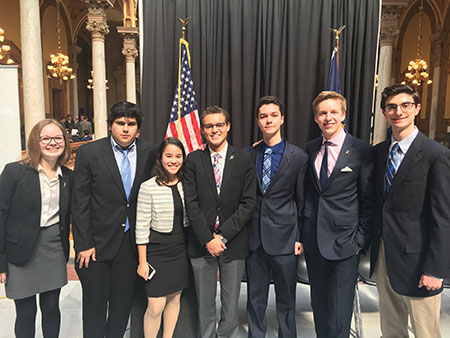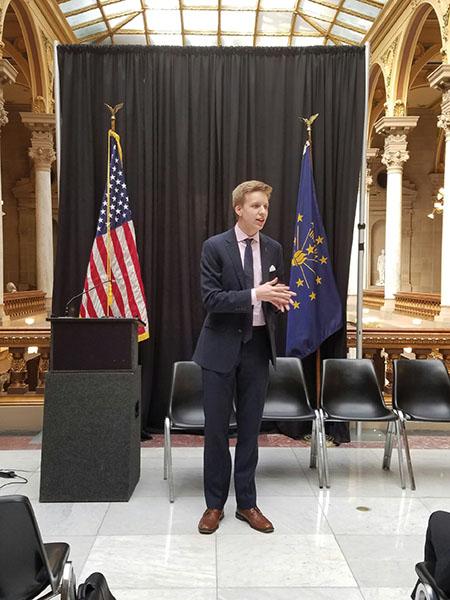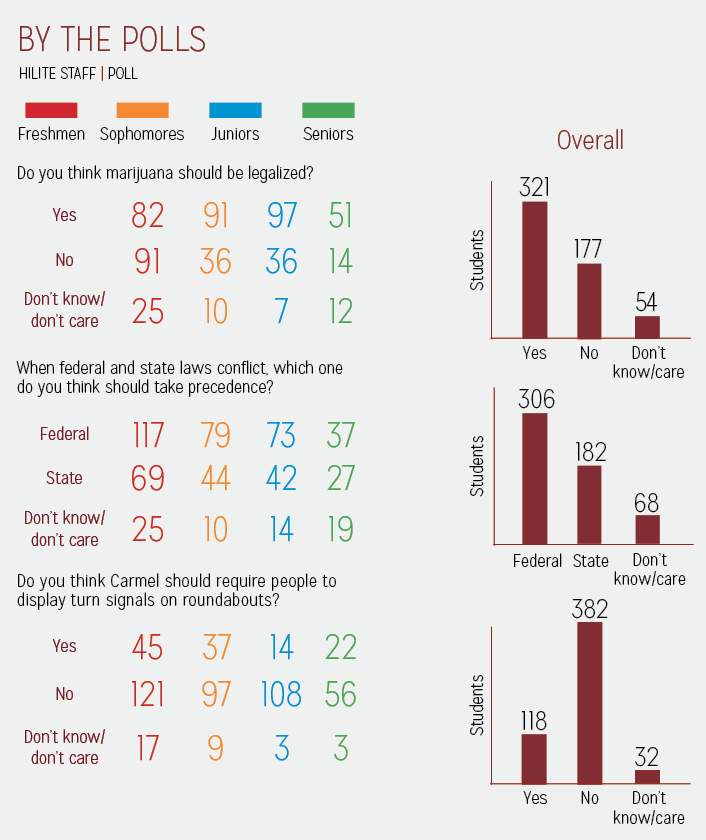Your donation will support the student journalists of Carmel High School - IN. Your contribution will allow us to purchase equipment and cover our annual website hosting costs.
Us vs. U.S.: With the coming of 4/20, CHS students, staff reflect on the implications of federal versus state power.
April 20, 2017
Senior Colton “Cole” Ferguson said he thinks the benefits of decriminalizing cannabis far outweigh the disadvantages. Ferguson is the chairman of Indiana High School Democrats, sits on the executive board for Indiana Young Democrats, is a member on the Indiana Youth Legislative Advisory Council and is one of the founding members of CHS Democrats.
Ferguson said, “We’ve already seen in California, Colorado, (and) all the other states that have legalized (marijuana), it’s become massive. A lot of economic growth has happened just due to them, hundreds of millions of dollars in growing and sales and taxes generated, so it’s good for both jobs and also the government, if they need more money, which is something that always happens.”

SAID IN THE STATEHOUSE:
CHS students pose at their statehouse conference. Cole Ferguson, president of CHS Democrats and senior, said he believed marijuana should be legalized.
In fact, states spend an average of $3,613,369,972 enforcing marijuana laws annually, according to the American Civil Liberties Union (ACLU). In contrast, legalizing marijuana in Colorado created over 18,000 full-time jobs and generated over $2.4 billion in economic activity.
Ferguson said decreasing incarceration rates and money spent on prisons are not the only advantages he expects from legal access to marijuana.
“I think it has a lot of other effects as well, like removing it from a black market, so not only removing people who are using it from prisons but also (reducing) the black market dealings as well, which can get shady or violent,” Ferguson said. “I’d prefer it to be fully recreationally legal, just because evidence shows it’s a lot less harmful than cigarettes and alcohol.”
However, despite legal access to medical cannabis in around 44 states, federal law still does not recognize the difference between recreational and medical use of marijuana, according to the Drug Enforcement Administration. The polarizing issue of legalizing or criminalizing cannabis is only the beginning of the tug-of-war between state and federal law.
While marijuana laws show the disconnect between state and federal laws, it is certainly not the only discrepancy. Issues such as education, gay marriage and more have differed greatly state by state.
However, Allison Hargrove, U.S. History and AP U.S. History teacher, said, “If you would ask, most people wouldn’t know who their state representative is, who’s speaker of the house, all that information. I would say a healthy percentage of students wouldn’t even know who the governor is in Indiana because Pence is gone now. A lot of people don’t know Holcomb replaced him.”

STUDENT POLITICIANS:
Cole Ferguson, chairman of Indiana High School Democrats, executive board member of Indiana Young Democrats, CHS Democrats leader and senior, speaks at the statehouse during an Indiana High School Democrats program. Ferguson said marijuana should be legalized nationwide.
GAY MARRIAGE AND ABORTION
Government teacher Connor Bradley said an important aspect affecting the way how people view state versus federal power is how strictly they interpret the constitution.
“One issue I think of is gay marriage. Some people might say that (decision) goes to the states because nothing in marriage law is discussed in the constitution; therefore, it has to go to the states,” Bradley said. “Other people might say, ‘No, it’s a 14th Amendment thing. It’s equal protection under the law, so it should be a national government thing.’ So I think a lot of it has to do with interpretation, and that’s why people put such a big emphasis on Supreme Court picks because they are the interpreters of the law.”
It is important to note that many controversial issues are dealt with in the Supreme Court. Most recently, Obergefell v. Hodges legalized same-sex marriage throughout the United States, including possessions and territories. At the time it was passed, many states had already legalized same-sex marriage, with some restrictions. In 1973, Supreme Court case Roe v. Wade recognized a woman’s constitutional right to bodily autonomy.
Bradley emphasized that decisions like this are the reason that people advocate so heavily for Supreme Court picks. Since issues that are more often opinion and ideologically driven such as same-sex marriage and abortion rights are dealt with at the Supreme Court level, representatives in the court are imperative.
For his part, Ferguson said he views federal versus state power on an issue-by-issue basis. Although he said he thinks the federal government should have the final say, he thinks the federal government shouldn’t get involved in a state’s direct policy-making.
EDUCATION
 However, state laws may affect some individuals more than other individuals. Hargrove said state laws affect her more individually since she is a teacher.
However, state laws may affect some individuals more than other individuals. Hargrove said state laws affect her more individually since she is a teacher.
“I’m in the wheelhouse that it’s an equal effect. I think more attention is given to the federal level, so maybe it gets more notoriety, but state does affect us,” Hargrove said. “Education is a unique situation since it is given to the states to have more authority.”
Both Bradley and Ferguson said they think education can be more effectively handled at a state level.
Bradley said, “I think (Common Core) goes back to a discussion that was had during the Federalist-Antifederalist debates. Is it easier to govern at a micro level or a macro level? Education reform now like with Common Core says macro, we want everyone to be on the same page. I do think education is something that should be, while there is some understanding in terms of where everyone is across the map, I think states can do a better job understanding what is needed for the students in their state.”
Ferguson said he thinks in theory, nationwide standardization and the No Child Left Behind act were good ideas, but have not been effective.
Ferguson said, “Beforehand we had a dichotomy between some states in terms of how good their education systems were or how deep they would go. But I think on a state-by-state basis it went better.”
Ferguson said while he supports state power more for the issue of education, he has a more federalist mindset when it comes to others issues, such as healthcare.
RELIGIOUS FREEDOM
Senior Andrew Ardizone said he is a conservative Republican. Ardizone also said he campaigned for Republican candidates. Most recently, this was Todd Young. Ardizone said despite advocating for small government, recent Indiana laws were unnecessary and already dealt with on a national scale.
Ardizone said, “The Religious Freedom Restoration Act (RFRA) was absolutely unnecessary to add. Federal law already covers the religious freedom to deny service and it says you can deny service to anyone for any reason. So adding it to the state law only made people angry for no reason and hurt the Indiana economy.”
REFUGEES
Ardizone said he also believes the refugee crisis should be solved at a federal level due to the lack of uniformity throughout the country.
He said, “Congress needs to decide on whether to let (refugees and immigrants) in or not, then decide how much vetting and what the vetting will look like  from these areas. States that are blocking refugees individually have the right to do it, but that doesn’t mean they necessarily should.”
from these areas. States that are blocking refugees individually have the right to do it, but that doesn’t mean they necessarily should.”
Hargrove said, “I don’t think we’re focusing too much on a national level, I think we’re not focusing enough on a state level.”
Bradley said recently, presidents such as Barack Obama and George W. Bush signed executive orders when the Congress was of the opposite party, which allowed for them to bypass that divide.
Bradley said, “When you have a president who’s a Republican and a Congress that’s Republican and you’re signing executive orders, it kind of doesn’t make sense. If we see legislation being pushed through in the next two years that people don’t agree with, I think you’ll find that we have an overwhelming Democrat majority in the House and Senate come 2018.”
However, in the end, Bradley said it’s important to remember that state laws will have a much greater impact on the individual than national laws.
Hargrove said, “Maybe the magnitude is not as significant, but they have tremendous authority in our lives and people just don’t even pay attention to it. Part of that is media driven.”
Ferguson said, “The way I’ve always seen it in terms of how the federal government’s policies generally work is they have less of an effect on each individual, but the fact that they will usually have an effect on so many more, I guess the difference is the individual impact versus the amount of individuals it impacts.”
